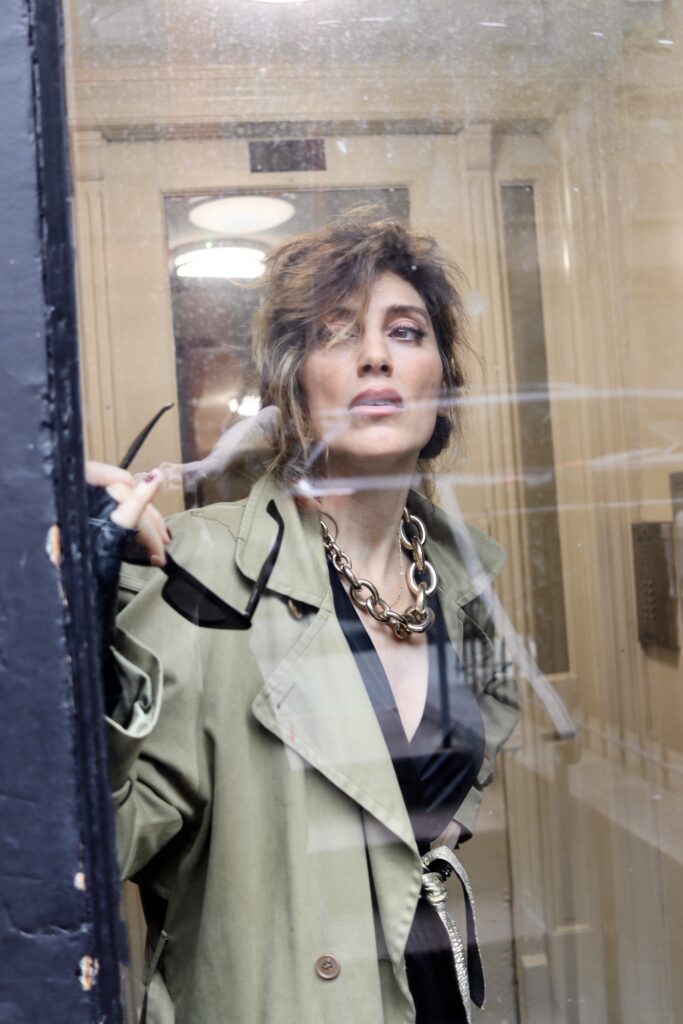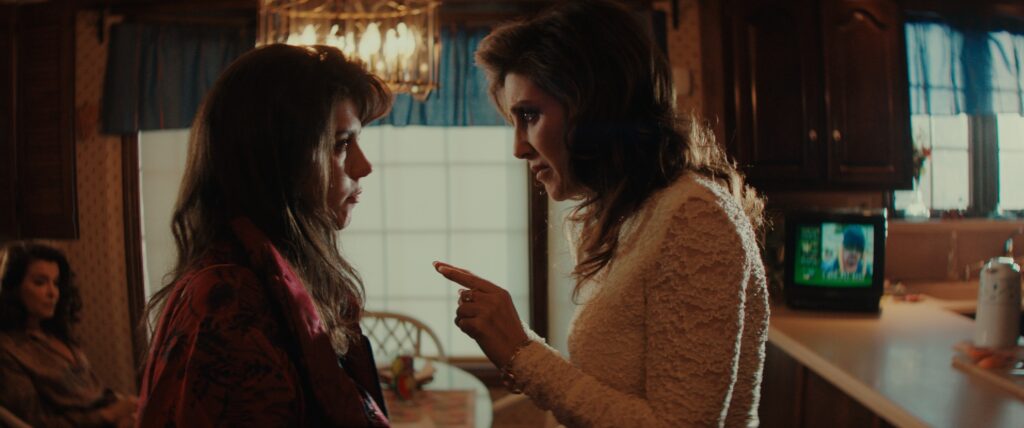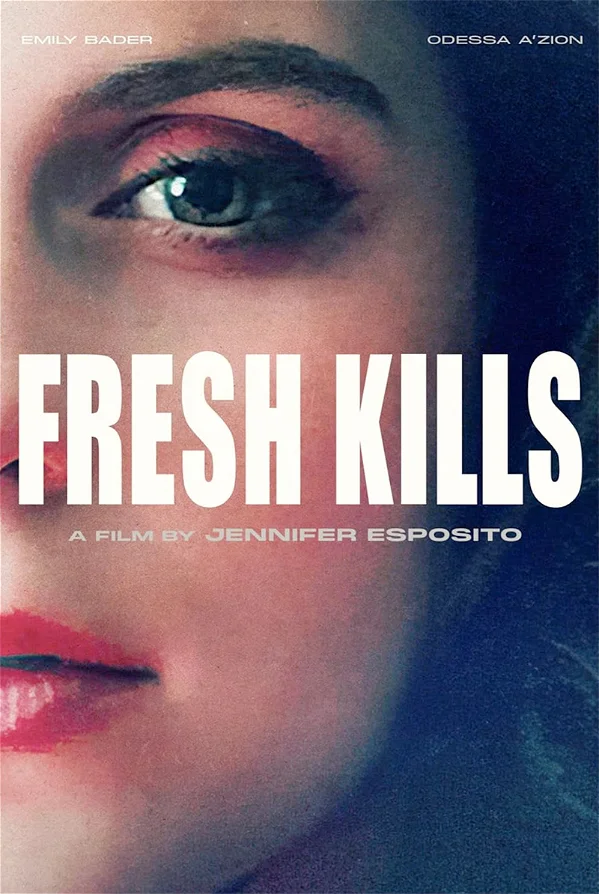The SAG Award-winning actress kills it with her first film Fresh Kills about young women stuck in the mafia. PETER DAVIS speaks with the auteur in New York.

Jennifer Esposito photographed in New York by Tina Turnbow
Thus far, Jennifer Esposito has been known mostly as an accomplished actress. All that is about to dramatically change with the brilliant Fresh Kills, a grippingly emotional, adrenaline-rush of a film she wrote and directed (and stars in) about two young girls, Rose and Connie (played by Emily Bader and Odessa A’zion) stuck in a mafia family in Staten Island.
You were a child in Staten Island, but I am guessing your dad was not a mob boss, like Joe the father in the film.
It wasn’t my family, but I grew up around families like this. I was around these girls. I moved from Brooklyn to Staten Island when I was nine. As I got older, the fights and the rage and the violence that I saw through the women were frightening. I was involved in it just being there. I remember thinking, why are these girls so angry? I guess it’s because their father is in the mafia. That would make me mad. I’m a very big why person. I need to understand things.
You’ve had a great career as an actress. Now you’re a writer and a director.
I always wanted to be a filmmaker or a storyteller. As a young woman, I didn’t know exactly what that meant, but I knew I was not staying in Staten Island. I left around 17. I put myself through acting school waiting tables. I wanted to go to NYU to study film but didn’t have the money.
When did you decide to tell the story of young women trapped in a mafia family, they both love and hate?
That story always stayed with me. I realized why it stayed with me throughout the years, because as I got into the business, I started to be told: you’re female… you’re not going this way…you have to go that way. Because I was born female, I had a ceiling that I was going to eventually hit my head on. I was supposed to get married, have kids. And the rage that I saw in these girls, I started to understand as my own. I didn’t agree to these rules. That’s where the rage came from, from being born into something they knew they were never getting out of. I’ve become friends with some of them, and they have seen the movie and said, ‘you hit it right on the head.’
It’s a big, bold move to direct a movie.
I was aging as a woman in the business. It’s like you’re done for. And I just thought, stop complaining. No one cares, Jennifer. No one’s picking up the phone. I had no agent. I didn’t have a manager. I had no one. When I started to go after making this movie, it was freeing. I had started writing this many times and stopped because the voices seep in like, oh, you can’t do that. Around six years ago I was in a bad place. I was painfully unhappy with the work I was seeing and what I was doing. I thought: you’re going to sit down and finish this, or you’re quitting. Those are your two choices. I did not stop until I finished the script. Then trying to get it made – that was a whole other bunch of insanity.
Getting a movie made is almost a miracle. And probably not easy without big name stars attached. And it’s your debut as a director which is such a male-dominated field.
I was a first-time female writer/director, a cross to bear. I speak to a lot of young filmmakers and they’re like, ‘yeah, well, you had an in in the business,’ but that did not help me. To even get someone to read it was a big thing. I went to everyone I could about funding. I went to personal friends that believed in me and they gave a little bit here, a little bit there. I went to my husband [Jesper Vesterstrøm], I was like, ‘I’m going to mortgage the house.’ I just made the decision. It was not an easy conversation. But I will say I have never in my life had someone support me 100% more than my husband.

Emily Bader as Rose and Jennifer Esposito as her mother Francine in Fresh Kills
Fresh Kills shows the emotional and physical chaos of life in the mafia through the eyes of women, particularly Rose and Connie who are young girls. We are used to movies about men in the mafia. The women are usually just supporting characters.
It’s always about the men. The mafia is very hardcore male. We’ve never seen a correct portrayal of the women. We’ve seen a little bit with Carmella in Sopranos, but nothing completely through the female’s eyes and especially the young female point of view. I was stepping my foot into a mostly male genre. There’s not been one female that has stepped into the genre. And here I come and I’m going to tell it from a different point of view. It was like, tell her to sit down, tell her to go away. Then it was: ‘why didn’t we think of that?’ It’s funny – I think I’ve heard of five different shows and movies that are about the female point of view in the mafia.
Odessa A’zion as Connie and Emily Bader as Rose blew me away with their performances.
I wanted someone so raw for Connie and Emily. I kept hearing there’s no stars in your movie because that’s what people care about. And it’s like, you’re so wrong because these young women – their work is better than most I’ve seen today. They are so grounded and brilliant. They’re honest, open and present. They gave their hearts to this. I think they both have huge careers in front of them.
You also play Francine, the mother to the two girls.
Originally, I wanted to be Rose, and then I thought, no, be Connie. And time went on and I wasn’t aging backwards, I was like, well, I’ll have to be Francine. Francine was based on someone that I know. It was such a complicated character. She’s your best friend and your worst nightmare, all in the same sentence. I knew all that personally. To try and explain that to an actress, the minutiae of it, I thought just play the role yourself.
Francine was based on someone that I know. It was such a complicated character. She’s your best friend and your worst nightmare, all in the same sentence.
Jennifer Esposito
Has the woman you based Francine on seen the film?
Yeah, and she thought it was great. She didn’t see the problem with Francine, which is so perfect. It’s like, of course not. I take that as a compliment.
You filmed the movie in lightning speed.
We shot in 21 days through four different time periods. You just move, you fly. The directing part came easier to me because this is what I really should have been doing my whole career. I love telling the whole story. I am more suited to do this than just show up and say lines. I was able to tell the story through the actors, but also through the shots and the way this world looks.

The sets and the costumes were spot-on. It felt like watching a documentary, like cinema verité.
T.V. Alexander, our production designer, came on three weeks prior. She said, ‘you really want pink carpet?’ I gave her a reason why I wanted the house to be so feminine. The house is so feminine because it’s the only place Francine controls. She’s going to put Joe [her husband, played by Domenick Lombardozzi] in the most feminine, gaudy environment. That’s her way of saying: ‘screw you.’
You shot during the end of the pandemic. Yikes!
It was nuts. When Covid happened, I said, if I don’t do this now, we are not doing it. We need to do this. I don’t care. We’re doing it.
Who do you identify most with in the movie?
When you write something, there’s always pieces of you all over the place. And there are, but who I am is Rose. That’s who I am, who I had to become in this world is Connie.
The scenes with Connie and Rose are intense and must have been emotionally exhausting for the actors.
Especially Emily [as Rose]. Emily had a lot of emotional stuff to carry. By the end she was like, ‘get me out of Staten Island. I need to go home and rest.’ But when you’re doing work you’re proud of it, the tiredness feels good. I know they’re both proud, and I couldn’t love this cast more for trusting me.
You’ve worked with Spike Lee on Summer of Sam, Paul Haggis on Crash and so many great directors. Did you pick stuff up on set?
You take from everywhere, being on set for so long and seeing what works. But I did take a lot from Barry Jenkins. He doesn’t know it and I never got to work with him, unfortunately, but I’d love to. Moonlight really resonated with me. I felt like the shape of Fresh Kills was very much like Moonlight. I went back and read everything there was about Moonlight and his plan of attack and how and why and what cameras he used and what shots and why.
Have you shown Fresh Kills in Staten Island?
Not yet. Some of the women that I grew up with, that are of this life, have seen it and just loved it. I’m very grateful for that.
Fresh Kills premieres in theaters on June 13th. Click HERE to get tickets.

